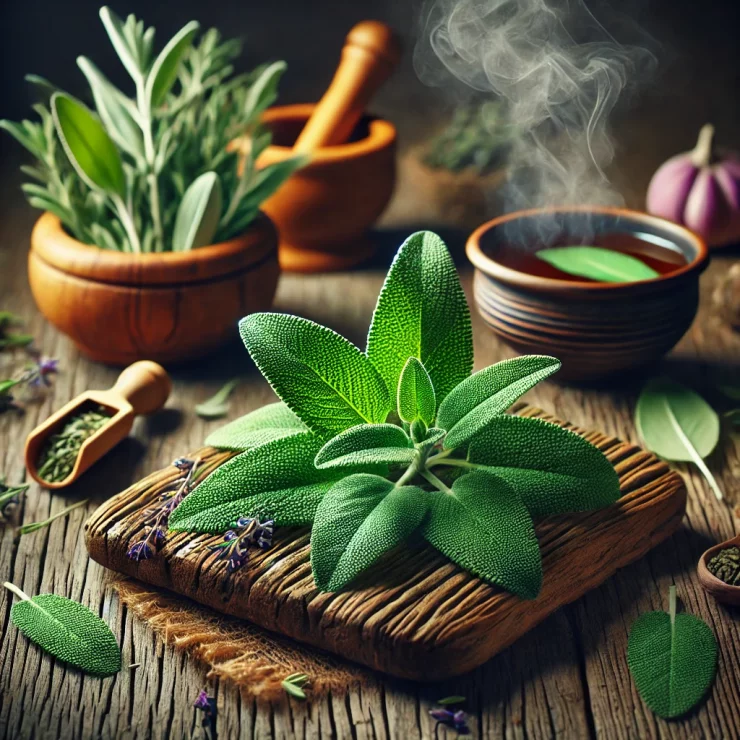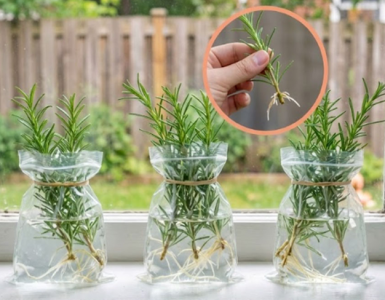Sage (Salvia officinalis) is a powerful herb that has been used for centuries in traditional medicine for its remarkable healing properties. Revered by ancient civilizations and modern herbalists alike, sage is known for its ability to support human health in various ways. From boosting cognitive function to improving digestion and soothing inflammation, sage is truly a miracle plant. Here’s everything you need to know about the healing power of sage and how it can benefit your health.
1.Rich in Nutrients and Antioxidants
Sage is packed with essential vitamins and minerals that support overall health. It contains high levels of vitamin K, which is important for bone health and blood clotting, and small amounts of vitamins A, C, and E. Sage is also rich in antioxidants such as flavonoids and phenolic acids, which protect the body from oxidative stress and reduce the risk of chronic diseases.
Key Nutrients:
Vitamin K: Supports bone health and helps with blood clotting.
Antioxidants: Protect the body from free radical damage, slowing the aging process and reducing inflammation.
Calcium and Magnesium: Help strengthen bones and support muscle function.
2.Improves Cognitive Function and Memory
Sage has long been associated with improving brain function and memory. Studies have shown that compounds in sage can enhance cognitive performance, especially in older adults or those at risk of Alzheimer’s disease. Sage may increase levels of acetylcholine, a neurotransmitter that plays a crucial role in learning and memory. It also has antioxidant and anti-inflammatory properties that protect the brain from oxidative stress.
How It Helps:
Boosts Memory: Sage helps improve memory retention and recall.
Protects the Brain: The herb’s antioxidants support brain health and may reduce the risk of cognitive decline.
Enhances Focus: Sage tea or supplements can increase concentration and mental clarity.
3.Supports Digestive Health
Sage is a natural remedy for digestive issues, such as indigestion, bloating, and gas. Its anti-inflammatory and antispasmodic properties help soothe the digestive tract and reduce discomfort. Sage can also stimulate the production of bile, which aids in the digestion of fats.
How It Helps:
Eases Indigestion: Drinking sage tea can relieve bloating, gas, and indigestion.
Stimulates Digestion: Sage helps promote healthy digestion by encouraging bile production.
Reduces Inflammation: The herb’s anti-inflammatory properties soothe the digestive tract, reducing discomfort.
4.Balances Hormones and Eases Menopausal Symptoms
Sage has been traditionally used to regulate hormones, particularly in women experiencing menopause. Sage contains phytoestrogens, plant-based compounds that mimic estrogen in the body. These compounds can help balance hormone levels and reduce symptoms of menopause, such as hot flashes, night sweats, and mood swings.
How It Helps:
Reduces Hot Flashes: Sage tea is often used to help women manage hot flashes and night sweats.
Balances Hormones: Phytoestrogens in sage can help regulate hormonal imbalances.
Eases Mood Swings: Sage’s calming properties help reduce anxiety and mood fluctuations associated with menopause.
5.Soothes Sore Throat and Respiratory Issues
Sage is a popular herbal remedy for sore throats, coughs, and respiratory infections. Its antimicrobial and anti-inflammatory properties make it effective in soothing irritated tissues in the throat and lungs. Sage tea or sage-infused gargles can help reduce swelling, kill harmful bacteria, and promote faster healing.
How It Helps:
Sore Throat Relief: Gargling with sage tea can reduce throat inflammation and ease pain.
Fights Infections: Sage’s antimicrobial properties help fight off bacteria and viruses that cause respiratory infections.
Soothes Coughs: Drinking sage tea can help calm a persistent cough and reduce irritation in the lungs.
6.Promotes Skin Health and Healing
Sage is rich in antioxidants and anti-inflammatory compounds that are beneficial for the skin. It can help reduce signs of aging, such as wrinkles and fine lines, and protect the skin from environmental stressors. Sage also has antibacterial properties that can be useful in treating skin conditions like acne and eczema.
How It Helps:
Anti-Aging Benefits: The antioxidants in sage protect the skin from free radical damage, helping to reduce wrinkles and fine lines.
Treats Acne: Sage’s antibacterial properties can help prevent and treat acne breakouts.
Soothes Irritated Skin: Applying sage-infused oils or creams can calm irritated, inflamed skin.
7.Boosts Immune System
Sage contains compounds that have immune-boosting properties, helping the body fight off infections and illnesses. The herb’s antimicrobial, antiviral, and anti-inflammatory effects make it a great natural remedy for colds, flu, and other common infections. Drinking sage tea regularly can help strengthen your immune system and reduce the frequency of illness.
How It Helps:
Fights Colds and Flu: Sage tea can help relieve symptoms and shorten the duration of colds and flu.
Strengthens Immunity: Regular consumption of sage can boost your body’s ability to fight off infections.
Reduces Inflammation: Sage helps control inflammation in the body, which is linked to many chronic diseases.
8.Supports Oral Health
Sage is often used in natural toothpaste and mouthwashes due to its antibacterial and anti-inflammatory properties. It can help reduce plaque, prevent cavities, and treat gum disease. Gargling with sage tea or using sage-based products can also help freshen breath and reduce oral infections.
How It Helps:
Prevents Cavities: The antibacterial properties of sage help protect teeth from decay.
Reduces Gum Disease: Sage can soothe inflamed gums and reduce the risk of gum infections.
Freshens Breath: Using sage as a mouthwash helps eliminate bacteria that cause bad breath.
9.Supports Heart Health
Sage contains flavonoids and antioxidants that can help protect the heart and improve cardiovascular health. The herb’s anti-inflammatory properties can reduce the risk of heart disease by preventing inflammation in the blood vessels. Additionally, sage may help regulate cholesterol levels and improve blood circulation.
How It Helps:
Improves Circulation: Sage promotes healthy blood flow and helps prevent blood clots.
Regulates Cholesterol: The antioxidants in sage help manage cholesterol levels, reducing the risk of heart disease.
Reduces Inflammation: Sage helps prevent inflammation in the arteries, which can lead to heart problems.
How to Use Sage
There are many ways to incorporate sage into your daily routine, whether through food, teas, or topical treatments.
1.Sage Tea:
Boil fresh or dried sage leaves in water for 5-10 minutes to create a soothing tea. Drink it daily for immune support, digestive health, or relief from sore throats and coughs.
2.Sage Infused Oil:Sage-infused oil can be applied topically to the skin for anti-inflammatory and healing benefits. It can also be used as a massage oil for sore muscles.
3.Cooking with Sage:
Add fresh or dried sage to soups, stews, and roasted vegetables for added flavor and health benefits.
Sage is much more than a culinary herb—it’s a miracle plant with powerful healing properties. Whether you’re looking to improve digestion, boost brain function, or soothe respiratory issues, sage offers a natural solution for a variety of health concerns. Incorporating sage into your daily routine can enhance your well-being, offering benefits for both body and mind.






Add comment